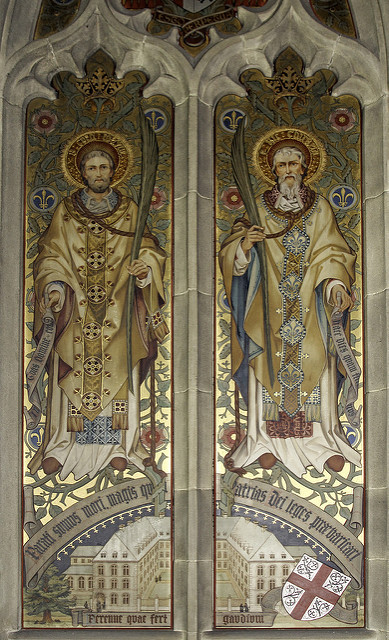With the 450th anniversary celebrations of the founding of the English College in Douai, Fr Peter Harris relates the history of the institution which became a centre for training Catholic priests for service in Elizabethan England and the forerunner of our own seminaries today.
On September 29th 1568, Father, later Cardinal, William Allen and a small group of fellow exiles from the University of Oxford, took possession of a group of buildings that they had leased in the town of Douai in what were then the Spanish Netherlands. Allen and his fellow exiles knew very well the value of collegiate life. Having first settled at Mechelen they had moved to the nearby town of Douai where the King of Spain had opened a new Catholic University. Allen had been befriended by a local man, Jean Vendeville, who occupied the chair of Canon Law at the new university. Vendeville was particularly interested in establishing colleges for missionaries, both to the new world and to the now protestant parts of the old. It had been with Vendeville’s financial help that Allen had earlier taken the lease on a large house, close to the University’s theological schools. There was no doubt that Allen wanted to found an academic institution but specifically training priests for the English Mission came later. One of the first students, Lewis Barlow was ordained in 1574 and offered to return to England to assist his countrymen. Ten more did the same in 1575, 11 in 1576, 24 in 1577, and 20 in 1578. Most of them held English university degrees and had been disillusioned by events in England.
The early years of the college were financially precarious, local benefactors including religious houses such as the Abbeys at Arras, Marchiennes and Anchin contributing what they could. But in due course these gifts, augmented by the salaries that Allen and others were paid for teaching at the University, were handsomely added to by annual pensions from Pope Gregory XIII and Philip II, King of Spain.
Allen was to go on to found another college at Rome, and he played a vital part in Robert Persons SJ’s foundations in Spain at Valladolid, Seville and Madrid. The movement was continued later by another foundation at Lisbon.
It is thought that 194 (62%) of the Elizabethan seminary priests were imprisoned at some time or other. One hundred and fifteen fell into government hands within a year of arrival, 35 while still in the ports where they had landed. One hundred and sixteen were executed, 91 were banished, of whom 24 returned.
Douai (and also whilst in exile in Rheims) produced some remarkable scholars, for example those who produced the first Catholic translation of the bible into English, the Rheims Douai version (1582-1610).
Allen himself died in Rome in 1594 but a succession of Rectors continued to steer the Douai college through sometimes troublesome waters through the last decades of the 16th and into the 17th century. A new college began to be built on the site from 1600, to be rebuilt again in the 18th century. As time went on young men were also sent to Douai for general education, not expecting to continue to studies for the priesthood. By the 18th century these ‘convictors’ formed an important part of the college and enabled many of the lay families still in England to obtain a solid foundation in the faith for their sons. A number of them left behind gifts of secular silver some of which still exists. As time went on there were rectors, ‘Presidents’, and professors of the college called to be ordained bishops, perhaps one of the best known today being the saintly Bishop Challoner.
The town of Douai did not only give hospitality to the English secular clergy. There were also houses of English Benedictines and Franciscans (Recollects). There was an Irish college and a college run by the Scottish Jesuits, dedicated in turn to St Patrick and St Andrew.
Douai became part of French territory in the 18th century, and the French revolution, and particularly the declaration of war on England in 1793, brought the closure of the colleges and their assets were seized and many of their collegians imprisoned.
Returning to England the remaining students of the English college came together first at a Catholic preparatory school near Ware in Hertfordshire, but Bishop Douglas in London and Bishop William Gibson in the north could not agree on a single college and so the sister colleges of St Edmund’s and St Cuthbert’s came into being at Old Hall Green, Ware and Ushaw, Durham. To this day St Cuthbert’s, Ushaw continues its education mission through the work of the University of Durham, especially its Centre for Catholic Studies and St Edmund’s College as the oldest Catholic independent school in England. The work of the formation of priests continues in Allen Hall Seminary at Chelsea in London.
We are indebted for much of the first half of the above to Rev Dr David Milburn’s 2011 publication Douai’s Day.




